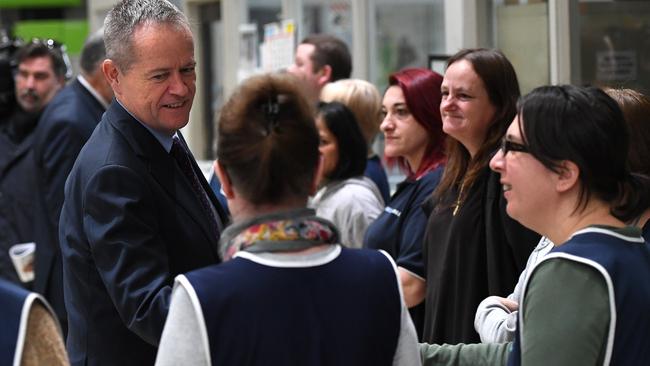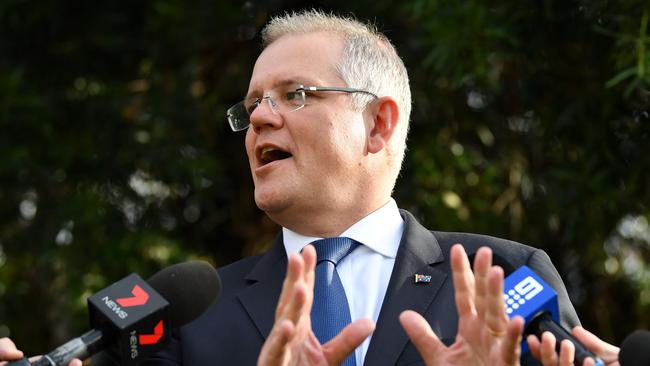It worked for Trump and Corbyn. Now Shorten is trying populism
BILL Shorten is grabbing the populist ring and Malcolm Turnbull’s been caught short. It’s another reason Shorten shouldn’t be underestimated, writes Laurie Oakes.

Rendezview
Don't miss out on the headlines from Rendezview. Followed categories will be added to My News.
YOU have to feel a bit sorry for Scott Morrison as Bill Shorten revs up Labor’s crusade against economic inequality.
Shorten has all the rousing lines, and delivered them with gusto a week ago in a speech titled “Tackling Inequality: A Labor Mission”.
Lines like: “Inequality is Australians going for years without a pay rise — but paying more taxes than their boss.”
And: “Inequality kills hope. It feeds that sense, that resentment, that the deck is stacked against ordinary people, that the fix is in and the deal is done.”
The Treasurer’s denial of an increase in inequality, in a speech to the Australian Industry Group a few days later, contained lines that were not quite so punchy.
“The Gini coefficient based on gross household income has declined from 0.382 to 0.366 since 2011,” Morrison said.
And: “The HILDA survey has shown relatively little change in household income inequality between the endpoint of 2001 and 2014.”
He explained that HILDA is a survey of Household, Income and Labour Dynamics in Australia. Google reveals that Gini measures the income or wealth distribution of a nation’s residents.
Good stuff for pointy-headed economists and the business elite, no doubt, but rather less likely to excite the punters.
Especially when Reserve Bank Governor Philip Lowe — focusing on “wealth” rather than “income” — was out there confirming a rise in inequality.
“Wealth inequality has become more pronounced particularly in the last five or six years because there’s been big gains in asset prices,” Lowe said.
The “fairness” theme based on nasties in the 2014 Budget worked well for Shorten before last year’s election.
Now, with the “inequality” campaign, he has the government on the defensive again.
That Morrison accusing him of running a “populist agenda” is hardly likely to cause the Labor leader much distress. Economic populism is … well, very popular, these days.
It worked for Donald Trump. It worked for Jeremy Corbyn when he almost toppled Tory Prime Minister Theresa May in the recent British election. Now it has been embraced by the Democrats in the US as they seek to recover from last year’s Trump trouncing.
They are stealing the President’s populist clothes.
At the start of the week top Democrats rolled out an economic policy based on the claim that working class Americans are suffering because prosperity and power have become too concentrated in the hands of a wealthy few.
The Democrat senate leader Chuck Schumer said: “First, we’re going to increase people’s pay. Second, we’re going to reduce their everyday expenses.”
The document proclaimed that too many families believe ”the rules of the economy are rigged against them” by large corporations and special interest lobbyists.
And it promised a $1 trillion infrastructure jobs plan, a big lift in the minimum wage, and a new “trust buster” initiative to “crack down on monopolies” and restrain corporate power.
It is a clear break from the losing approach of Hillary Clinton. The American Democrats and Shorten are pretty much on the same page. That must give the Labor leader a confidence boost.
And the Shorten attack seems to have caught Malcolm Turnbull and his Government unprepared. Again.

Shorten is once more demonstrating that his political smarts should not be underestimated. And, as he did with his promise to curb negative gearing, he is refusing to adopt a small target strategy.
This weekend he will be announcing several tax reform proposals that could be politically risky but mesh with the inequality theme.
It must gall Turnbull to see the opposition leader so often setting the terms for political debate.
But it is Morrison’s job to argue the Government case in the debate on economic inequality and it is an unenviable one.
Apart from anything else, it covers a multitude of issues — slow wages growth, penalty rates, job security, housing affordability, cost of living, taxation, bank scandals, lack of equality for women in pay and superannuation, even education and health care.
Shorten has found himself an all-purpose theme.
As for Morrison, at least he understands the problem he faces.
In his AIG speech, accusing Shorten of trying to con people over inequality, he said: “When you consider many Australians have not enjoyed the same level of growth in their personal financial circumstances as others, it is easy to fall into the trap and nod agreement.”
Exactly.
And there is one more reason to sympathise with the Treasurer.
He tried his hand at a bit of economic populism himself in the May Budget — most notably with the imposition of a new bank levy.
And, if Newspoll is any guide, it didn’t win the coalition a vote.
Laurie Oakes is the Nine Network political editor


